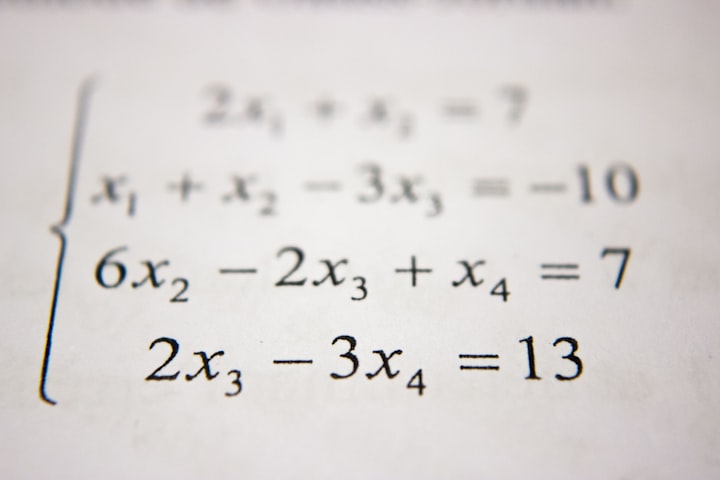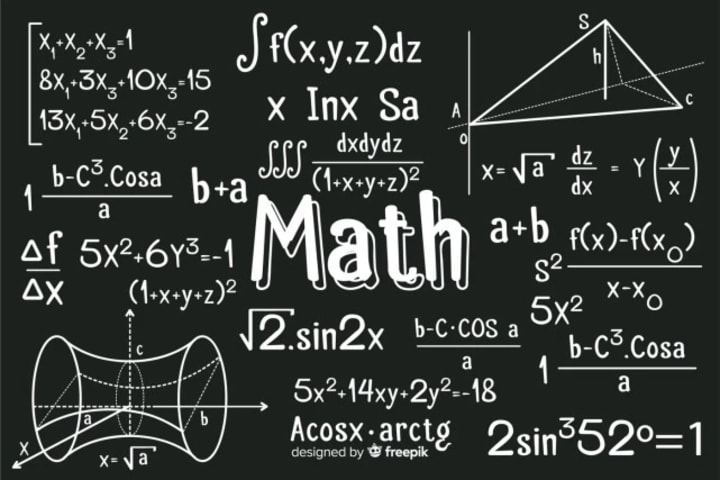How "crazy" are the top mathematicians? The abyss of mathematics, ordinary people can only float on the water
Mathematics in Today

The phrase "no madness, no life" is perhaps more appropriate for mathematicians.
Mathematics has evolved from thousands of years ago to become an extremely rigorous and abstract discipline.

Perhaps we can simply calculate a quadratic equation, or in the mind can calculate the result of a simple fraction
But thousands of years ago these were very complex and tedious derivations, and in fact most of the mathematics we learn today is the result of simplification and argumentation.
When confronted with a number relationship or an equation, we only need to use a formula, or a set of laws of logic to answer some of the questions in mathematics.
If it were not for the logical derivations and proofs of mathematicians day and night, most people would probably be stuck with addition and subtraction.
Don't believe me?
To take the simplest example in arithmetic, how do you calculate the multiplication of a number within two digits without learning the multiplication mnemonic or the exchange property, and how do you get the result in the easiest and most convenient way?
The simplest one is perhaps to keep adding calculations. Only after countless calculations and inferences, the average person may find the law of factors and products in multiplication, and then eventually gradually deduce the secret of the multiplication process.
But for mathematicians, I am afraid that sensitivity to numbers is a perfectly normal skill.
Ther knowledge of mathematics goes beyond the ordinary, with precise understanding and revolutionary discoveries, and those mathematicians who can rewrite the transformation of human society are the jewels of humanity.
When it comes to numbers, one figure in mathematics that cannot be skipped must be Pythagoras.
What we learn today about the right triangle theorem is the result of his work.
Or maybe it is Euclid, as the father of geometry, the 13 volumes of Euclid's Elements became the subject of study for many mathematicians.

Although geometric problems were the main direction of Euclid's research, the comprehensive introduction to the basic number theory made his contribution further open the gap with other mathematicians of his time.
After civilization entered a period of rapid development, free from the grip of religion, other outstanding mathematicians were Gauss, Newton, Hilbert, and so on.
The contributions they brought to the world can be described as far-reaching, and to this day, the mathematical knowledge they left behind is still a nightmare for many students after many centuries of experience.
The abstraction of mathematics is difficult to describe in words, and only the concise language of combinations between numbers can describe the inference of a formula.
So what is math really about, and how crazy is all this top math?
The word mathematics comes from the ancient Greek, and it refers to a field of knowledge that includes problems such as numbers, arithmetic, formulas and related structures.
In shape, they can in turn refer to problems in the spatial geometry of objects, or to quantities and their variations, such as calculus.
Mathematics reveals the hidden patterns that help humans understand the world, not only arithmetic and geometry today, the data processing, measurement and scientific observation derived from mathematics, and the reasoning, deduction and proof that mathematics brings.
If reveals natural phenomena, models of human behavior, including our society.
In logical reasoning, mathematicians strive to develop their results through systematic reasoning to avoid false theorems.
Often these false proofs come from our everyday intuitions about mathematics, and in order to allow deductive reasoning, some basic assumptions need to be explicitly recognized as axioms.
Traditionally, these axioms were chosen on the basis of common sense, but modern axioms usually represent formal guarantees of the original concept.
The simplest example of this is the creation of mathematical language by mathematicians, where some errors of expression arising from the use of language must be eliminated in order to ensure rigor in mathematical problems.
For example, when we learn geometry, we often see words such as "when and, only and", so that we can succinctly extract direct and useful information from the text to respond to and answer the question.
In addition to special language, mathematics makes extensive use of special symbols, which are essentially designed to simplify the expression of mathematical ideas and to facilitate the rigorous presentation of problems.
Mastering and learning and understanding mathematical symbols and language is also an important part of the process of learning mathematics, so perhaps it is time to consider whether students who do not do well in mathematics have not mastered mathematical language and symbols thoroughly enough.
Of course, the process of creation and transmission is a very long one, especially as mathematics develops more and more widely.
Mathematicians once reached a state of "superhuman" to solve mathematical problems, even in the eyes of ordinary people are crazy.
The quadratic formula describes all quadratic equations
Archimedes was one of the most prolific philosophers, mathematicians, and artists of the ancient Greek period, and his insane obsession with mathematics was even fearful of death.
It is said that when the ancient Roman Empire attacked ancient Greece, the Roman army attacked the interior of the city-state in a big way.
At this time, Archimedes did not care about what was happening around him, but was concentrating on his own formula problems.
At that moment, a Roman soldier came up to Archimedes, who knew that there was no way to save the fate of Greece, and just said let me finish it.
Unfortunately, the Roman soldier did not know how to read, raised his hand short sword and cut towards Archimedes, a generation of mathematical master thus died by the sword.
As the saying goes, Gauss is better than blue, Gauss in 2000 years later let the mathematical world for the amazement of the genius mathematician may be Gauss such a person it.
Since childhood, he was able to teach himself to understand basic mathematics, and by the time he reached high school he was already able to answer university questions.
One day his teacher gave him a homework assignment, but accidentally gave Gauss his research project on positive 17-sided shapes.
As a result, Gauss was not tamed by the puzzle, but rather a moment of excitement to solve the problem that has plagued the mathematical community for more than 2,000 years in just one night.
Newton left his wife for mathematics and lived alone for the rest of his life.
Gauss forbade his son to study mathematics for the sake of its reputation, and Ramanujin, the Indian "civil science" god, studied mathematics on his own without receiving professional study and left various formulas for future generations.
In his opinion, mathematics was just a revelation from God, and there was nothing remarkable about it.
So we can see that these mathematicians are crazy enough to be incomprehensible even.
It is not an exaggeration to compare mathematics to a deep, bottomless ocean, and the average person's level of mathematics can only be considered as floating on the surface.
We start learning about numbers in preschool, and in elementary school, we start to understand more about number relationships, and related to that, arithmetic, percentages, and fractions.
In secondary school, we learn more about equations, algebra, geometry, and trigonometry.
In college, we try to learn calculus, limits, statistics, trigonometry, and so on, which is basically the highest level of mathematics we can explore.
But after thousands of years of development, mathematics has already branched out into many more detailed mathematical problems.
For most people, this is an excellent level of study. Although the textbook says "advanced mathematics," this is only the shallow end of the sea of mathematics.
Further down, there are differential equations, tensor, group theory, Riemann conjecture, Yang-Mills theory, topology ......
These problems are only studied by top mathematicians, and reaching here is almost already deep in the dark waters.
Mathematics in this region, the study of each proposition will take mathematicians decades, or even a lifetime to get a solution.
If not for the extreme passion and aspiration for mathematics, the subject of mathematics therefore has an extremely high persuasive power.
The mathematicians we see are almost always a stereotype, for no other reason than that it really is too much brain work.
I'm fraid that except for genius mathematicians, most people just can't solve the mystery even if their hair falls out.
Mathematics has developed so many patterns today that it is almost integrated with modern science, and a complete classification of the hundreds of subfields in mathematics can reach 46 pages.
As a theoretically guided tool of modern science, both the development of mathematical talent and the study of mathematics itself can enhance one's logical and reasoning skills.
The beauty of mathematics is abstract, but brings with it a deep and universal knowledge of the world.
About the Creator
Flagler Danzig
The talent is 1% inspiration adds on 99% sweat, certainly, does not have that 1% inspiration, in the world all sweat to put or bring together also only is the sweat!






Comments
There are no comments for this story
Be the first to respond and start the conversation.